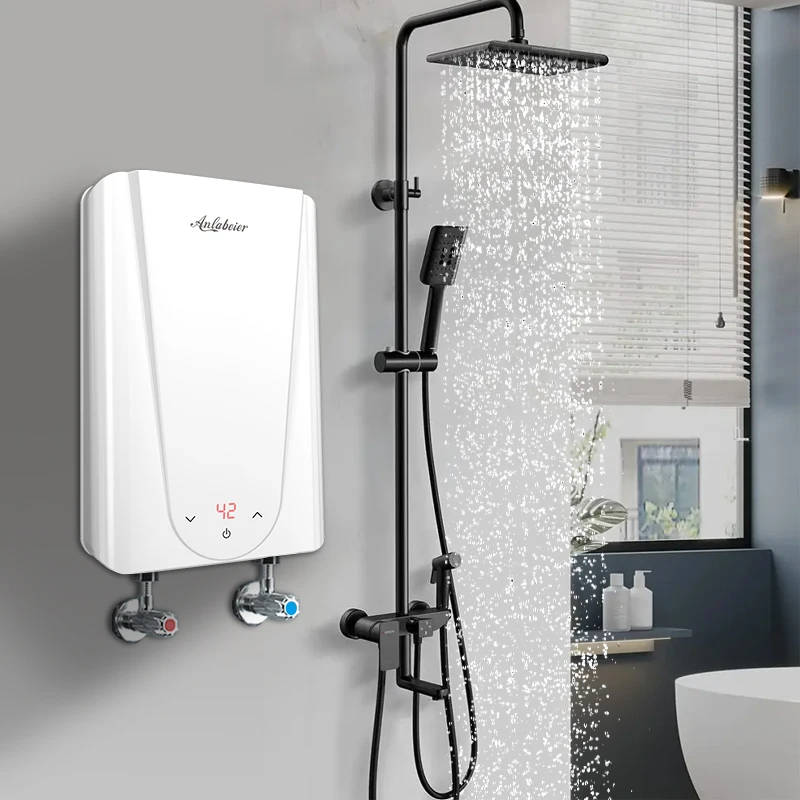Learning About The Pros Of On-Demand Water Heaters
Learning About The Pros Of On-Demand Water Heaters
Blog Article
We've discovered this great article pertaining to Unveiling the Hot Trend: The Benefits of Tankless Water listed below on the net and think it made perfect sense to relate it with you on this site.

In a world where convenience and performance reign supreme, it's no surprise that property owners are constantly on the lookout for smarter ways to manage their home's energy usage and convenience. One innovation that has actually progressively gained appeal is the tankless water heater. Yet what exactly makes these systems stand apart from the traditional tank-based models most of us grew up with? Let's dive in and explore the benefits of tankless water heaters, aiding you decide if it's time to make the button in your home.
Introduction
Photo this: you enter the shower after a lengthy day, expecting a comforting cascade of warm water, just to be welcomed by icy beads because the last individual utilized everything up. Audio familiar? Conventional hot water heater keep a set quantity of warm water, indicating you go to the mercy of that container's supply. Tankless systems, on the other hand, warmth water on demand. Say goodbye to running out mid-shower, no more fumbling with schedules just to ensure hot water is offered.
Understanding Tankless Water Heaters
What Are Tankless Hot Water Heater?
Tankless hot water heater, sometimes referred to as on-demand or instant water heaters, provide hot water just as it's required. Instead of storing gallons of pre-heated water, these units kick into action the moment you switch on the faucet. Water travels through a warm exchanger, warming up in real-time, indicating you get a nonstop flow of warm water without the need for a big container sitting idly by.
Exactly how Do They Differ from Traditional Solutions?
Conventional heaters hold a storage tank of warm water, using power to maintain that tank at a regular temperature level. Tankless systems get rid of the standing supply, minimizing wasted energy and the large footprint of a huge cylinder. Essentially, you're updating from a "stockpile" state of mind to a "made-to-order" strategy.
Usual Kinds Of Tankless Systems
Tankless water heaters usually come in two ranges: gas and electric. Gas designs tend to supply greater flow rates, suitable for bigger homes, while electric versions usually serve smaller homes and are commonly less complicated to set up. Additionally, some systems are made for point-of-use (offering one fixture) while others can deal with the entire home's hot water requirements.
Secret Advantages of Tankless Water Heaters
1. Countless Warm Water Supply
Ever had to set up showers so every person gets their reasonable share of warm water? With tankless, that comes to be a thing of the past. As long as the heating system's flow ability isn't exceeded, you can take back-to-back showers without developing into a popsicle.
2. Power Effectiveness and Expense Savings
Say goodbye to warming a giant container's worth of water and maintaining it toasty throughout the day. Tankless heating units reduce standby power losses, which can decrease energy costs. While the initial expense may be higher, the lasting savings usually validate the financial investment.
3. Space-Saving Style
If your home is short on storage, removing the cumbersome container frees up important room. Tankless units are compact and can often be installed on walls, stashed in corners, or installed in tight energy wardrobes without hogging the whole area.
4. Longer Life-span
A properly maintained tankless water heater can outlive its tank-based relative. Traditional storage tanks may last 10-15 years, while tankless versions can maintain chugging along for two decades or more, making them a strong financial investment over time.
5. Improved Water Top Quality
Storing water in a container can in some cases bring about sediment buildup or a somewhat "off" preference. With tankless systems, fresh water is heated on the spot, minimizing the chances of sediment buildup and potentially using cleaner-tasting water.
Factors to consider Prior To Switching
Though the advantages are engaging, it's important to think about a few aspects prior to totally devoting.
Initial Investment Prices
Tankless heating systems normally feature a higher upfront price tag. Between the device itself and prospective installment adjustments, the initial cost may give you sticker label shock. Yet keep in mind to watch it as a lasting investment.
Installation Requirements
Depending on your home's framework, you may require extra electrical capability or gas line upgrades. Ensure you recognize the installation demands and talk to a professional to stay clear of surprises.
Evaluating Your Home's Water Use Patterns
If your family concurrently utilizes numerous fixtures with high hot water demand, ensure the system's flow price meets your demands. Recognizing your usage patterns aids you choose the best size and kind of tankless heating system.
Upkeep and Care Tips
Tankless systems are fairly low upkeep, however they aren't set-it-and-forget-it home appliances.
Routine Cleansing and Descaling
Difficult water minerals can develop in the warmth exchanger, affecting efficiency. Regular descaling (typically suggested each year) keeps the device going for peak performance.
Annual Professional Examinations
A yearly checkup from a specialist makes certain minor issues are caught early. They'll analyze the unit's performance, look for leaks, and assist preserve ideal performance.
Ensuring Appropriate Ventilation
For gas models, correct ventilation is vital to safely get rid of exhaust gases. Ensure venting systems are clean and correctly set up to prevent any kind of prospective security dangers.
Comparing Different Brands and Models
Not all tankless hot water heater are developed equal.
Investigating Reliable Producers
Search for trusted brands with a background of creating quality units. A trusted supplier commonly offers far better client support and longer service warranties.
Reading Testimonials and User Comments
Individual reviews and responses from next-door neighbors or pals who have gone tankless can offer valuable insights. Often, real-life experiences can be much more telling than marketing pamphlets.
Installation: DIY or Specialist?
While some home owners enjoy dealing with jobs themselves, tankless installment might not be the most effective time to break out the toolbox.
Advantages and disadvantages of Do It Yourself Installation
A DIY install could save money, yet it features risks. Inaccurate installment can bring about inefficiency or security issues. If you're handy and have experience, it could be practical-- yet proceed with caution.
When to Call an Expert Plumbing Technician
For a lot of, calling a professional makes certain everything's done correctly. A professional plumber recognizes local codes, sizing needs, and airing vent parameters, reducing the threat of incidents.
Making the most of Effectiveness
You have actually bought a tankless unit-- now optimize its performance.
Optimal Temperature Level Setups
Lots of people establish their devices between 120-140 F. Adjusting the temperature can improve comfort and cost savings. Experiment to discover a sweet area that does not throw away power.
Pairing with Low-Flow Fixtures
Wish to stretch your system's capabilities? Consider mounting low-flow showerheads and faucets. They reduce water use, permitting your tankless system to supply a constant stream of hot water without stressing.
Environmental Influence
Tankless water heaters line up with greener living goals.
Lowered Carbon Impact
By using much less energy and only heating water as required, tankless systems can lower your home's carbon footprint, lowering your environmental impact.
Saving Natural Resources
Less energy consumption and much less wasted hot water equate into fewer natural resources being used, an ecological win-win.
That Profits Many from Tankless Heating units?
The appeal of tankless heating units is that they can suit a selection of houses.
Large Families vs. Single Passengers
Huge families could like the unlimited hot water supply, while solitary occupants appreciate the power financial savings from not heating a whole tank for simply someone's morning shower.
Property Owners with Minimal Space
If your home is short on square video footage, losing the large container liberates room for other essentials-- or perhaps just a lot more breathing space.
Eco-Conscious Customers
Going tankless aligns with environmentally friendly worths, guaranteeing you're not wasting power or resources.
Future Trends in Tankless Water Heaters
The world of home devices is ever-evolving, and tankless water heaters are no exception.
Smart Home Combination
Visualize adjusting your hot water heater's temperature level by means of an app or receiving upkeep notifies on your phone. As smart home technology breakthroughs, we'll see more connectivity and convenience.
Innovations in Innovation
R&D is constantly enhancing heat exchangers, making devices more effective and long lasting. Future versions could be even quieter, much more small, and far better fit for differing environments.
Final thought
Selecting a tankless hot water heater is more than just upgrading your home's warm water system; it's buying long-lasting comfort, energy effectiveness, and a greener way of living. By considering your household's water use, being mindful of installment requirements, and dedicating to routine upkeep, you can appreciate a consistent stream of warm water without the baggage of a large container. As modern technology progresses, you can look forward to even smarter, extra effective tankless services that not only make your life less complicated but likewise benefit the planet.
Pros and Cons of Tankless Water Heaters
Tankless Water Heater Pros
Saves Energy: Simply put, you re spending less energy to create hot water, so your total carbon footprint goes down, not to mention your bills. Lasts Longer Than Storage Tanks: Storage tank units need to be replaced every 15 years or so. But tankless units? They can last for 30 years before they give out on you. Constant Hot Water: Need to take a shower and don t want the water running cold? Awesome it won t. The water will stay hot the entire time because it creates hot water on demand. Saves You Money: Less water usage equals less money. Beyond that, you re not paying to keep water hot 24/7. Those savings add up quickly. Better for the Environment: Less water waste is better for everyone. It saves you money, but it s also environmentally conscious at the same time. Tankless Water Heater Cons
It Can Take a Minute: Depending on your specific unit and its placement, it can take anywhere from 10 seconds to 2 minutes to fully heat up. Because there s no storage tank, it heats water as you need it. Upfront Purchase Price: While we talked about their longevity, there s sticker shock when you look at brand-new tankless units to install. It pays for itself, but it s still a big chunk of change at first. Has its Limits: If you run multiple appliances at once, such as the dishwasher, washing machine, and maybe you take a shower at the same time, there might not be enough hot water. https://www.airsouthnow.com/blog/water-heater-service/pros-and-cons-of-tankless-water-heaters/

I was made aware of that article about Pros and Cons of Tankless Water Heater from an associate on another blog. Sharing is nice. One never knows, you could be helping someone out. Thanks so much for taking the time to read it.
Book Services Report this page